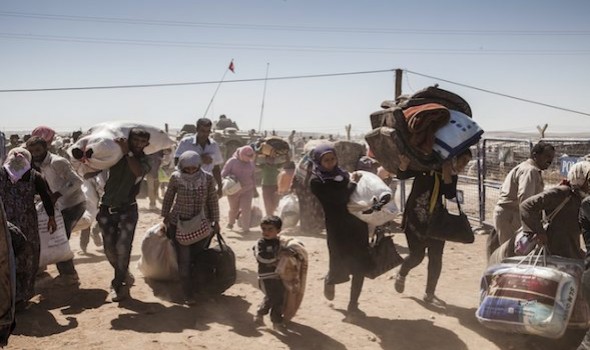Wanted: a fairer deal for Syrian refugees
Wanted: a fairer deal for Syrian refugees

As the war in Syria enters its fifth year there is still no agreement within Europe on the best way to provide protection to the millions of refugees who have fled since 2011.
While European Union law states that asylum-seekers should apply in the first country they enter, usually in southern Europe, in practice most Syrians trying to reach Europe head for member countries in the north.
Over 40,000 Syrians arrived across Italy’s borders in 2014 alone, but since 2011 there have only been 2,000 applications for asylum there. They move on and apply elsewhere. Over half of all Syrian refugees in Europe have been given protection in Sweden and Germany.
In the UK there is a high recognition rate for those Syrians who make it across the Channel: 86 per cent of arrivals have been given some sort of protection. But to get to the UK legally is almost impossible. Only a few thousand visas for travel were granted to Syrians from outside the UK last year. The number of visas granted has dropped every year since the war started.
The controversial EU law that stipulates that asylum-seekers must claim sanctuary in their first safe country of entry is known as the ‘Dublin’ regulations. Campaigners who oppose it say poor reception and accommodation conditions in Italy, Greece and Bulgaria put refugees in a difficult position when trying to start a new life.
The UN refugee agency recently called for a better distribution of refugees throughout Europe. It wants to see Syrians given more safe routes into countries of their choosing, perhaps based on family links or work and language skills. This, the organisation says, would reduce the numbers going to Germany and Sweden, and give Syrians an incentive to stay in their country of arrival.
This would stop the huge numbers of Syrians who currently stay under the radar, travelling illegally so they can avoid the fingerprint identification that would trap them in Italy or Greece. Anyone fingerprinted in these countries can be sent back there under the Dublin law.
In February, the head of the refugee agency, Antonio Guterres, asked the UN Security Council to back better burden-sharing of the crisis across Europe.
“Following the example of countries like Germany and Sweden, other states in Europe and the Gulf region should consider offering legal access with more opportunities, in order to alleviate some of the pressure on Syria’s neighbours and give more refugees an alternative way of reaching safety,” he said.
The refugee agency’s refugee resettlement programme aims to take the most vulnerable Syrians from camps and move them to safety without the danger of an illegal journey. Despite a call for all European countries to participate, there has been a sharp discrepancy in the number of places offered. Germany has again led the response, offering to give homes to over 30,000 Syrians. The UK originally resisted, saying it was focusing on contributing to the humanitarian response, but last year agreed to resettle a few hundred people. So far 143 Syrians have been resettled in the UK.
Turkey’s President Recept Tayip Erdogan commented, “Do you know how many displaced Syrians have been received by European countries? 200,000. We have welcomed two million. What a difference! Western countries, who claim they are much richer than us, leave refugees to die.”
Picture depicts Syrian refugees cross over into the outskirts of Kobani, Turkey after fleeing their homes.


